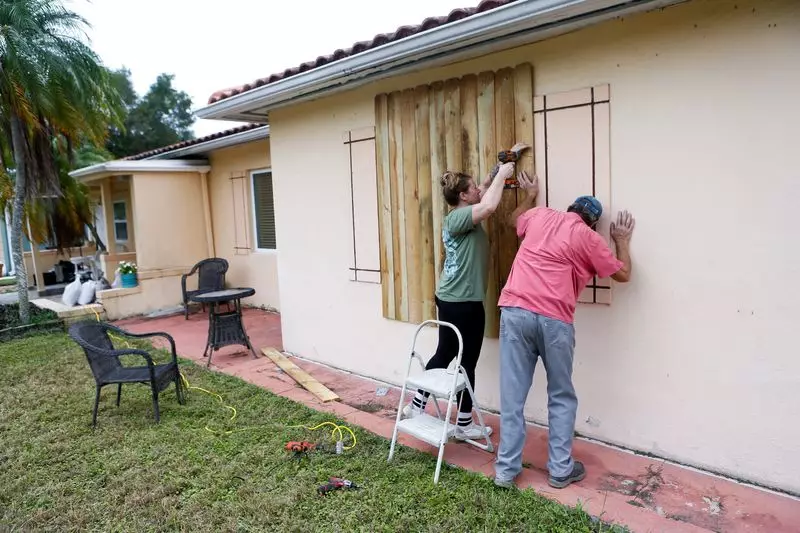As Hurricane Milton approaches Florida, experts are voicing legitimate concerns about its potential impacts on the state’s already beleaguered property insurance market. With winds gusting at a terrifying 160 mph, Milton poses an imminent threat to the Tampa Bay region, home to over three million residents. The ramifications of this storm extend far beyond immediate safety concerns; they could signify a critical inflection point for an insurance system that is struggling under the weight of escalating claims and dwindling provider confidence. Projections of insured losses ranging from $60 billion to $100 billion present a stark reminder that Floridians will likely bear the brunt of not only the storm’s physical destruction but also its financial fallout.
Florida has long been a focal point of a national insurance crisis, struggling with ballooning premiums that have increased by an average of 31% nationwide over recent years. More specifically, Florida’s homeowners face the highest insurance costs in the country—averaging over $4,000 annually. This dramatic rise in expenses can be traced to the confluence of various factors, including climate change, inflation, and a retreat from the state by many national insurers. In the wake of multiple disastrous hurricanes, including the catastrophic Hurricane Katrina, a significant number of providers have opted to vacate this high-risk market entirely. This exodus has left consumers to navigate an environment populated by smaller, less financially stable players who often lack the necessary resources to handle extensive claims.
Systemic Risk and Consumer Impact
Martin Weiss, founder of Weiss Ratings, articulated the inherent risks that have eroded consumer trust in the system. Incidents of claim denial are becoming alarmingly common; in fact, six of Florida’s major insurers rejected roughly 50% of claims in 2023—an unusually high figure for any state. Floridians, now faced with the jarring reality of amid-skyrocketing premiums, confront a dilemna: purchase insurance from questionable providers or risk going entirely uninsured, despite mortgage requirements mandating coverage. Statistics reveal that approximately one in 13 homeowners in the U.S. is uninsured, a number skewed higher among marginalized communities, exacerbating socio-economic disparities.
Furthermore, the emergence of Citizens Property Insurance Corporation in 2002 was supposed to provide some relief for homeowners unable to secure commercial insurance. However, the mechanism that allows Citizens to impose additional surcharges on all policyholders in the state should it run out of funds raises ethical questions about the sustainability of shifting financial burdens onto consumers.
Short-Term Relief with Long-Term Consequences
State officials and insurance organizations tout recent legal reforms aimed at curtailing “frivolous lawsuits” and “excessive claims” as essential measures for stabilizing the insurance market. Nevertheless, experts warn that the pressures exerted by Hurricane Milton could demonstrate the fragility of this so-called stability. If the storm results in severe damage, it may severely hinder any public trust that has started to be rebuilt and could compel more insurers to withdraw from Florida. This would place even greater strain on Citizens, which currently carries over 1.2 million policies and is the state’s largest insurer.
While there is a palpable sense of urgency surrounding Milton’s approach, the historical resilience of Florida’s real estate market, despite obvious geographical vulnerabilities, suggests a complex relationship between climate risk and property values. As one expert points out, despite the looming storm, real estate prices have not significantly dipped, indicating an esoteric allure that continues to attract people to the Sunshine State.
The specter of Hurricane Milton serves as a sobering reminder of the vulnerabilities facing Florida’s property insurance market, revealing a deeper systemic crisis that requires immediate and sustainable attention. The interplay of climate change, economic pressure, and consumer protection must be addressed to prevent further deterioration in access to affordable insurance options. As residents prepare for Milton’s landfall, the anticipation of both physical devastation and economic repercussions looms large, challenging state and industry leaders to engineer impactful reforms before the next storm inevitably strikes.
With the future of Florida’s unique landscape at stake, the collective hope is that both residents and policymakers will rise to the occasion, championing innovations and solutions that prioritize resilience, equity, and long-term stability in this storm-prone state.

